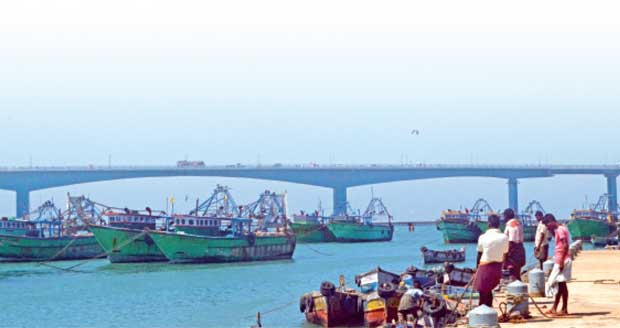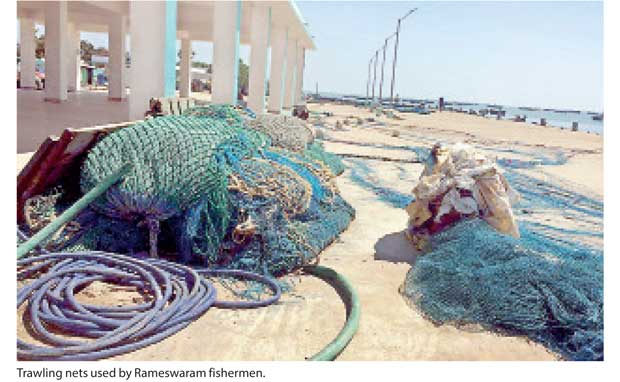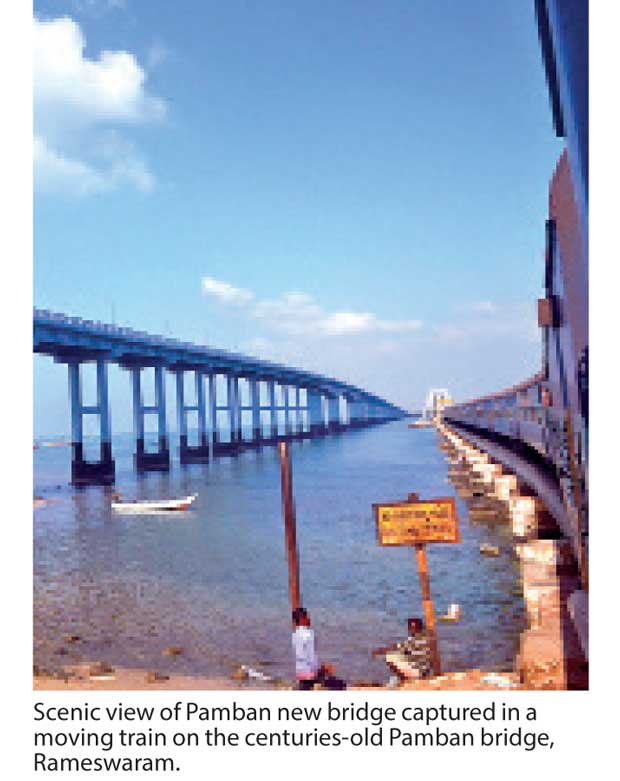Reply To:
Name - Reply Comment
Last Updated : 2024-04-19 09:27:00

At the break of dawn on March 05, 2017, as the rest of world was sleeping, Charles and four other fishermen fired up the engine of their trawler and left for fishing from Pamban Island, Rameswaram, India. Charles and his fellow fishermen were waiting for hours after setting the net in the middle of the sea near Danushkodi. Later, Charles pulled the net into the trawler and checked what was collected, but it was empty.
 The fishermen were anxious as they did not want to return empty-handed. One of the fishermen suggested to sail a little far and see whether they would be able to get a good catch. Charles and the others have already heard of stories of local fishermen being arrested by the Sri Lankan Navy when they tried to reach Sri Lankan Island Kachchaithivu which is known as rich with fish and aquatic resources.
The fishermen were anxious as they did not want to return empty-handed. One of the fishermen suggested to sail a little far and see whether they would be able to get a good catch. Charles and the others have already heard of stories of local fishermen being arrested by the Sri Lankan Navy when they tried to reach Sri Lankan Island Kachchaithivu which is known as rich with fish and aquatic resources.
With hopes of getting nets filled with prawns, fish and crabs, they set the nets in the seas near Kachchaithivu and started having lunch prepared by their wives. Suddenly, they spotted patrol boats of the Sri Lanka Navy that were nearing them. Charles threw his lunch aside and tried to turn the trawler to escape being arrested. However, his effort was to no avail. The Navy arrested Charles and his fellow fishermen on charges of trespassing Sri Lankan waters and using trawlers, which is illegal in Sri Lanka.
Thirty year old Charles and the other fishermen aged between 28-35 were taken to the Talaimannar (SLNS Thammanna) Navy Camp. Mannar Court ordered them to be remanded for two weeks at Vavuniya Prison. Charles claimed that they were forced to sleep in toilets on the first day in prison. He also said they didn’t eat anything for two days after having home-made lunch minutes before being arrested in the sea.
Meanwhile, the Sri Lankan government decided to release some 85 Tamil Nadu fishermen in a goodwill gesture on March 11 after four days of the controversial death of a 21-year-old Rameswaram fisherman Britto who was shot allegedly by the Sri Lanka Navy. Charles was one of 85 fishermen who were lucky enough to return home even before completing the period of imprisonment.

The Chairperson of the All India Traditional Fishermen’s Association X. Chinnathambi, said Tamil Nadu fishermen would brave any dangerous water in order to get a good catch because they call themselves hunters.
“Our lives are very tiring and dangerous as with every fisherman in any country including Sri Lanka. When we leave home to the sea for three to five days at a time, we don’t know whether we will come back safe. Our families are always anxious due to the uncertainty of our profession. Our life is all about fighting with waves to get the best catch. We are working hard because we don’t want to hand over this profession to our future generation. We don’t want them to face the struggle which we are facing. We want to send our children to school to hold other jobs and lead better lives. We cross the international maritime border as we can’t find enough fish on the Indian side,” Chinnathambi said.
He said beating, arresting or shooting of Tamil Nadu fishermen will not stop them coming to Sri Lankan waters.
Meanwhile, Chinnathambi alleged that four of his brothers had died in the sea after being shot by the Sri Lanka Navy.
“I want to say something to the Sri Lanka Navy. You shoot or not, we are coming to your waters. We are hunters. We can see no borders in the sea. All we need is fish. If we were afraid of death, we would not choose fishing as our profession. Even when we have lost our father, brothers and relatives, we still continue to fish in that region,” he said.
Meanwhile, the Daily Mirror interviewed the Chairperson of the National Fisherfolk Forum (NFF) M. Ilango who is fully involved in the subject.
“The fishermen in five districts of Tamil Nadu (Nagapattinam, Ramanathapuram, Pudukottai, Thanjavur and Thiruvarur and Karaikal of Puducherry UT) fish for their livelihood in the Palk Strait, the sea between India and Sri Lanka. For centuries the traditional fishermen of India and Sri Lanka have fished in the region in between the two countries with mutual fraternity and friendship. The fishermen from the North and North East region of Sri Lanka used to reach the shores of Tamil Nadu and would get their fishes sold, would stay back and eat in the houses of Tamil fishermen, stay over night to see movies of popular actors such as MGR and Sivaji Ganesan. The scenario drastically changed after 1983 when civil unrest arose in Sri Lanka. As a result, the fishermen of both the sides found it difficult to fish peacefully,” he said, explaining how the problems for the fishermen of both countries started.
After the LTTE war began in the Northern Part of Sri Lanka, fishing in Sri Lankan waters for Tamil Nadu fishermen was banned due to fears of arms and drugs transportation for LTTE via sea. Speaking about the ban, Mr. Ilango said there were reasons for the Sri Lankan Navy to start looking at the Indian fishermen as criminals.
According to Mr. Ilango, since the fishermen of the region other than Rameswaram and the 5 other concerned districts work under the traditional fisher panchayat system, they have never been involved in any illegal activities. However, people from non-fishing communities of Tamil Nadu started getting involved in fishing in the Rameswaram area.
Those non fisher community people infiltrated the fisher communities and were involved in illegal activities in the disguise of fishing, he revealed.
He said because of a few who engaged in illegal activities, the Sri Lankan Navy had been chasing even the fishermen who were actually fishing in the region, attacked and even shot them down sometimes. “The boats were even sunk by them, their fishing gear destroyed and the equipments and boats were confiscated. Around 600 fishermen were killed and over 1500 were wounded. The fishermen who fish for subsistence were treated as enemies and are being attacked by the Sri Lankan Navy,” he alleged.

However, in 1954 the Indian Ministry of Agriculture introduced trawling nets fishing technique to Indian fishermen under the Indo Norwegian Project (INP) aimed for developing fishing technology. The fishing technique is banned in Sri Lanka due to the damage of the seabed. As a result of the introduction of the new fishing technique, even traditional fishermen got involved in mechanized trawling.
“Looking at the devastation caused to our waters, we are forced to think that the government of Norway introduced trawling to India with the sole objective of destroying the marine resources of India. We have understood this at the very end of the resource depletion,” he said.
Mr. Ilango said despite Sri Lankan fishermen demanding that trawling should be given up, Indian fishermen are not willing to give up trawling.
According to him, about 95% of Indian fishermen do not even have a house or owned land. They live in puramboke land either in thatched houses or temporary stone walled houses. As they do not have their own land, they cannot provide landed collateral to Indian banks to obtain loans to set up boats and gear.
Mr. Ilango has got some proposals and solutions through which he believes the problem can be solved.
“It is the duty of the Indian governments, central and the state, to ensure that the fishermen of the region have livelihood option that would encourage them to give up fishing in the region between the two countries. If the fishermen are forced to take up solutions on their own without the support of the governments, then it will only lead to competing within the shallow water resources, resulting in loss of income for everyone of them. After spending thousands of rupees from loans for fuel and food stock for the camp fishing, quite often the fishermen end up selling for a cost lower than what they have spent. There is no guarantee of income and safety against loss. Hence it is important to provide loans upto Rs. 1 crore with a subsidy of 50%. For the loan amount of Rs. 50 Lakhs the very boat to be bought is to be taken on hypothecation. Funds should be provided through National Bank for Agriculture and Rural Development (NABARD) refinancing schemes and through the Micro Units Development and Refinance Agency (MUDRA) scheme,” he said.
He emphasized that the loan scheme should be introduced throughout the country immediately and for the fishermen who fished in the waters between India and Sri Lanka as the first set.
He proposed a survey that should be done in the given 6 districts to identify those traditional fishermen who wish to go to deep sea under the new scheme of the Indian Prime Minister Narendra Modi.
“Boats of those who did not wish to go into the deep sea, shall be bought by the government so as to make them incapacitated for use. A suitable compensation shall be provided for the same so that they can venture into other livelihood options. We insist that the scheme should be available only to the traditional fisher families in the Rameswaram region. Since the others are involved in illegal actitivies under the guise of fishing, resolving the issue is being delayed. And so their boats shall be simply taken over by the government and a compensation shall be provided. It is only thus we can arrive at a long standing solution to the issue of the Palk Bay region,” he added.
He said the fishermen could consider engaging in deep sea fishing only if the Indian authorities improve their boats with basic facilities that are needed to suit deep sea fishing.
“As we need to get the support of union and state governments in this regard, we need time to take up this transformation. Since we are awaiting the financial support of both Central and State governments and since the number to take the transition is large, we estimate that we would need 3 years to get them all to venture into deep sea and therefore these fishermen request permission to continue trawling till then. The Sri Lankan fishermen, during the dialogue, have been raising the question about the guarantee that the Indian fishermen will not venture into Sri Lankan waters after three years. By providing this assurance, the government of India can bring an amicable solution to this issue,” he said.

The island was historically owned by the kings of Ramanathapuram kingdom, Tamil Nadu. However, in 1974, India handed over the abandoned island Kachchaithivu to Sri Lanka. The waters around the island are rich with fish and aquatic resources. Tamil Nadu fishermen have put many efforts to get back the gift given to Sri Lanka and the efforts have even reached Supreme Courts several times.
The Chairperson of Alliance for Release of Innocent Fishermen (ARIF), Mr. Arulanandam, told the that they believe that the retrieval of Kachchaithivu would solve all the problems pertaining to both countries.
“This can be stopped only by taking back Kachchaithivu. If it was included in our territory, there is no need for our fishermen to cross over to Sri Lanka.
However, the Indian Central Government is still of the view that the gifts cannot be asked back.
“While many arrests are being made by both parties, the real point of the problem does not seem to be addressed, as both governments stay mute. Many politicians are willing to keep the problem unsolved, so that they can make use of it for their survival in politics,” he said.
The fishermen issue between Sri Lanka and India has been dragging on for several years, as both governments have failed to give a resolution despite having a number of discussion tables. However, not only Indian fishermen, but Sri Lankan fishermen too, are often arrested by the Indian Navy for poaching in Indian waters. Despite knowing it is illegal to trespass, their efforts for a good catch have not been reduced.
Sri Lanka Fisheries and Aquatic Resources Minister Mahinda Amarasinghe had previously told the media that the total loss of income to Sri Lanka from poaching by Indian trawlers could amount to Indian Rupees 80 lakhs to 200 lakhs per day and Indian Rupees 300 crore to 700 crore per year.
It is not a surprise that the use of bottom trawlers has ruined the fish and aquatic resources of India. On the other hand, if the Indian fishermen’s constant arrival is not stopped by giving them a good solution compatible to both countries, the fate of India’s seabed will be the same for Sri Lanka’s Northern Province as well, depriving the livelihood of Sri Lankan fishermen in the area.
Petty Wednesday, 19 April 2017 10:37 AM
Dirty politics

Add comment
Comments will be edited (grammar, spelling and slang) and authorized at the discretion of Daily Mirror online. The website also has the right not to publish selected comments.
Reply To:
Name - Reply Comment
On March 26, a couple arriving from Thailand was arrested with 88 live animal
According to villagers from Naula-Moragolla out of 105 families 80 can afford
Is the situation in Sri Lanka so grim that locals harbour hope that they coul
A recent post on social media revealed that three purple-faced langurs near t